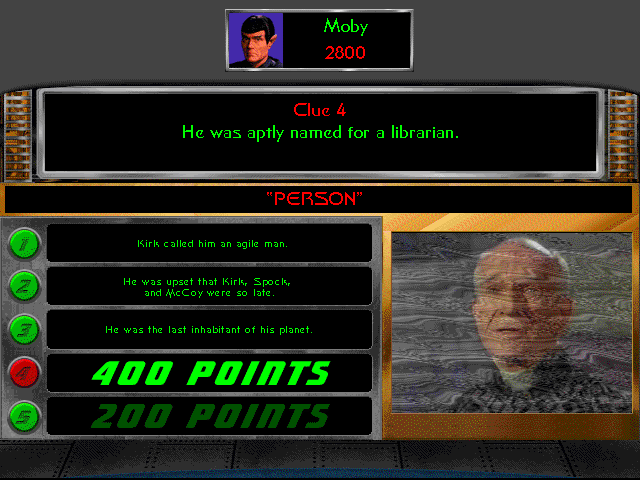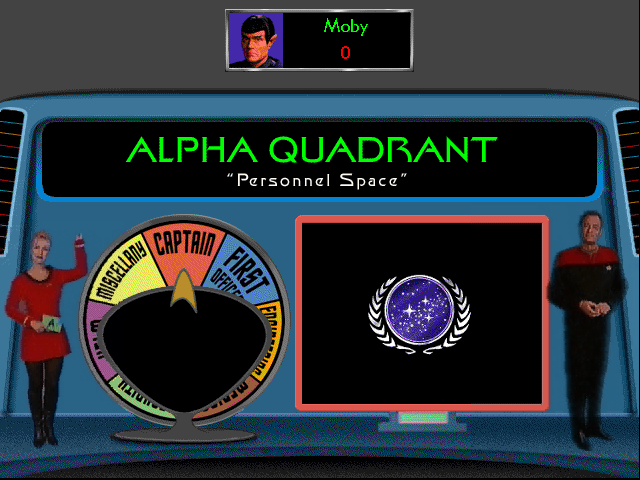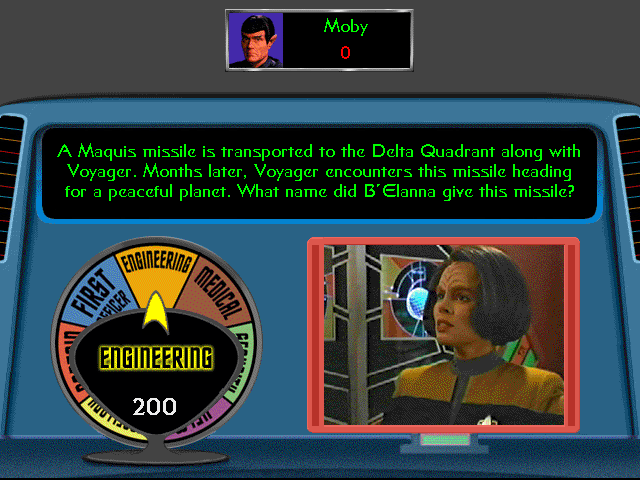Retro Replay Review
Gameplay
Star Trek: The Game Show offers a quiz-based gameplay experience that is both approachable for newcomers and satisfying for die-hard fans. At its core, the game features a variety of question types—multiple choice, audio identification, and rapid-fire true/false rounds—that test players’ knowledge of the first four TV series and the first eight feature films. The inclusion of audio and video clips as question prompts injects energy into each round, ensuring that players aren’t simply reading text but actively reliving iconic moments from the franchise.
(HEY YOU!! We hope you enjoy! We try not to run ads. So basically, this is a very expensive hobby running this site. Please consider joining us for updates, forums, and more. Network w/ us to make some cash or friends while retro gaming, and you can win some free retro games for posting. Okay, carry on 👍)
One of the standout elements is the involvement of Q, portrayed by John de Lancie, who serves as both host and mischievous adjudicator. His trademark wit and unpredictable interventions keep the pacing brisk and the atmosphere playful. Whether he’s scolding players for incorrect answers or offering cryptic hints, Q’s presence elevates the quiz format into an interactive performance. This dynamic host model not only enhances immersion but also encourages players to remain engaged, anticipating his next quip or challenge.
The game’s progression system is well structured, with difficulty tiers that unlock as you achieve higher scores. Early questions cater to casual fans by focusing on well-known incidents—Kirk’s “Kobayashi Maru” scenario, Spock’s “Vulcan logic”—while later tiers delve into more obscure details like secondary character arcs and behind-the-scenes trivia. This tiered approach ensures that the learning curve remains gentle without sacrificing depth, making it rewarding to improve your mastery of the lore.
For group settings, the multiplayer mode shines by allowing up to four players or teams to compete head-to-head. The split-screen interface and timed answer mechanics foster a lively, social atmosphere. If you’re hosting a small gathering or looking for a virtual pub quiz alternative, the multiplayer setup transforms your living room into the bridge of the USS Enterprise—complete with spirited rivalries and cheers with each correct response.
Graphics
Visually, Star Trek: The Game Show strikes a balance between functional clarity and franchise flair. The user interface borrows aesthetics from Starfleet computer consoles, featuring sleek lines, glowing panels, and a subdued color palette that echoes the look and feel of the Enterprise’s bridge. Menus are intuitively organized, with easily readable fonts and iconography that guides players through question categories, difficulty settings, and multiplayer lobbies with minimal fuss.
One of the game’s most appealing graphical aspects is its use of authentic video clips from the series and films. These sequences are seamlessly integrated into question prompts, momentarily replacing static text with full-color footage. Whether it’s a close-up of Data’s inquisitive expression or the dramatic reveal of a Romulan warbird, these high-quality clips provide visual context that heightens anticipation and rewards recognition.
Character portraits and animations also receive careful attention. Q, for instance, appears not only as a static headshot but as a fully animated 3D model during key moments, complete with gestural flourishes and mischievous facial expressions. This attention to detail lends personality to the proceedings, reminding players that they are interacting with a living, breathing character rather than a disembodied voice.
Sound design complements the graphical presentation by incorporating familiar musical cues—like the Starfleet insignia chime and the bridge ambience—to connect each question round to the larger Star Trek universe. This audiovisual synergy ensures that even though you’re playing a quiz game, the overall aesthetic remains undeniably Star Trek.
Story
While Star Trek: The Game Show doesn’t follow a traditional narrative arc, it cleverly weaves a framing story around the omnipotent trickster Q. The premise is simple: Q has grown bored of observing the Federation and challenges participants to prove their intellectual superiority or face his whimsical punishments. This meta-narrative device adds a layer of theatricality to each quiz segment, transforming rote trivia into a playful test of loyalty and wit.
The episodic structure divides content into themed rounds—“First Contact Chronicles,” “Vulcan Virtues,” “Captain’s Log,” and others—each introduced by a brief Q monologue. These vignettes provide just enough context to frame the upcoming questions, painting the quiz as a series of mini-adventures rather than disjointed pop-culture trivia. It’s an elegant solution that respects the source material without forcing an artificial storyline onto a quiz game.
Moreover, the game’s approach to canonical lore is both comprehensive and respectful. Questions explore character motivations, starship schematics, and iconic dialogue exchanges, ensuring that the quiz honors the franchise’s rich tapestry. By focusing on the first four TV shows and eight movies, the game creates a coherent timeline that resonates with long-time fans while avoiding the potential confusion of newer series or expanded universe content.
Occasional tie-ins to familiar episodes—such as referencing Kirk’s willingness to sacrifice for his crew or Spock’s logical dilemmas—offer emotional resonance amid the quiz format. Though it doesn’t chase after complex story beats, the game’s narrative framing succeeds by leaning into Q’s chaotic charisma and the enduring themes of exploration and intellect that define Star Trek.
Overall Experience
For fans of the franchise, Star Trek: The Game Show is a must-have addition to your digital library. It celebrates the legacy of Star Trek by turning your knowledge into an interactive, social experience. Whether you’re flying solo or challenging fellow trekkies, the game strikes a satisfying balance between accessible fun and deep lore exploration. The host’s playful banter and the evolving difficulty curve ensure that even seasoned experts will find fresh challenges.
Casual players may find certain question tiers daunting at first, but the built-in hints, replay options, and tiered difficulty make the learning process engaging rather than punitive. The inclusion of multimedia clips means that every answer feels like a mini reward, reinforcing correct choices with memorable visuals and sounds. Over time, you’ll likely develop a sharper recall for obscure details about characters, starships, and behind-the-scenes trivia.
From a production standpoint, the seamless integration of video, audio, and animated host segments demonstrates a high level of polish that elevates the quiz show genre. The multiplayer mode is particularly robust, encouraging friendly competition and replayability, while the single-player progression system caters to those who prefer self-paced mastery. Minor issues—such as occasional load times between clips—are rare and do little to detract from the overall flow.
In conclusion, Star Trek: The Game Show offers an immersive, entertaining, and richly detailed celebration of the original Star Trek canon. Its engaging gameplay, polished presentation, and thematic cohesion make it a standout option for anyone looking to test their Starfleet knowledge. Whether you aim to prove yourself a trivia titan or simply want an evening of spirited fun, this game delivers an experience that’s quintessentially Star Trek.
 Retro Replay Retro Replay gaming reviews, news, emulation, geek stuff and more!
Retro Replay Retro Replay gaming reviews, news, emulation, geek stuff and more!









Reviews
There are no reviews yet.